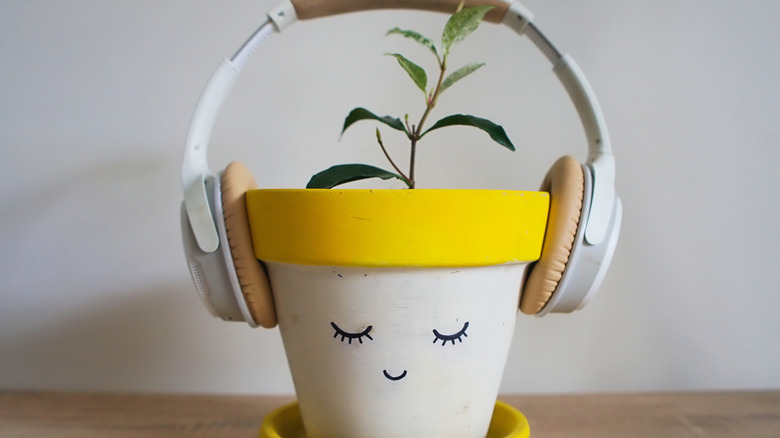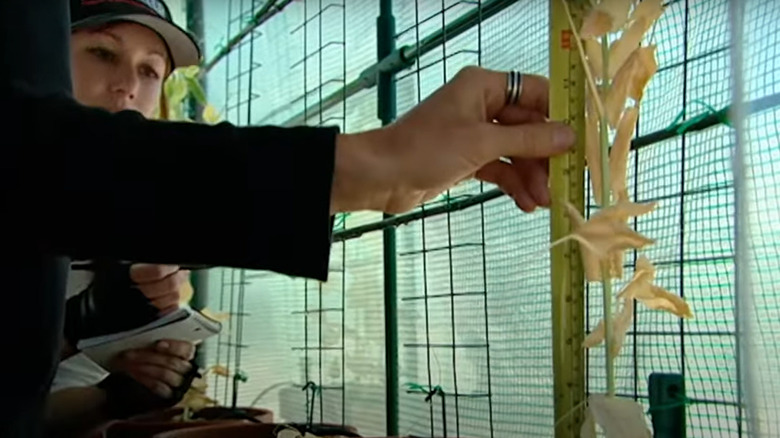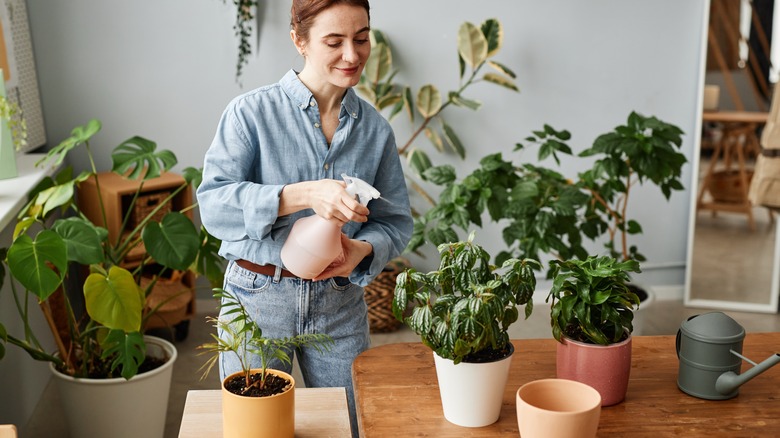Is Playing Music The Secret To Thriving Houseplants?
From Simon & Garfunkelto Roy Magnuson, there's no dearth of artists who have looked to plants to create moving odes. And so, it isn't bizarre to wonder if, conversely, music can move plants. The jury is still out. Although over 63% of gardeners admit to playing music for their plants, with over 45% noticing positive growth effects (via PPL PRS, a music licensor), the scientific community remains divided.
It all started in 1962 when Dr. T. C. Singh, an Annamalai University-based botanist, exposed several balsam plants to raga and Western classical music. Compared to the control group, the music listeners gained an additional 72% biomass and 20% height, positing that plants appreciate music despite lacking a central nervous system or auditory organs. The New York Times 1973 non-fiction bestseller "The Secret Life of Plants" further fueled the fire, pitching plants as cosmic beings that respond to sounds (although this concept lacks scientific rigor). It also inspired Dorothy Retallack, a music researcher with a minor in biology, to run a few experiments of her own and later avow that plants sway to jazz and classical music, but rock is a no-no.
The results that hold and the ones that don't
As expected, Retallack's action kicked off an avalanche of new research. 2014's Hassanien et al. paper examined the effect of different frequencies, exposure lengths, and sound pressure on cell division, germination rates, transpiration levels, stomata openings, and other flora aspects with encouraging results. Similarly, a study published in the International Journal of Environmental Science and Development found roses grew the best after listening to Vedic chants. Even MythBusters weighed in on the debate by subjecting seven greenhouses to different sound recordings, with death metal coming up on top and speech tapes not far behind.
There's a lot of room for debate. Experiments hold value only if their results are successfully replicated — a tall task considering it's hard to come across the same set of plants (in terms of growth and condition), soils, temperature, sunlight, wind, and water. Besides, evaluating whether growth is due to natural variability or music (assuming it's statistically significant) is challenging, too.
However, it's proven that plants respond to vibrations. They exploit the sound waves to move their roots toward sources of water, explaining why sometimes roots ingratiate themselves in sewer pipes. They also know when the sound is natural and don't respond when it's a recording. Moreover, pulsations stimulate the movement of organelles and nutrients within the plant's cells (cytoplasmic streaming), spurring its growth. You could use music to achieve this, although ambient noise works, too.
Time for a perspective switch
The fact that plants react to vibrations should be reason enough to hold a music session. Dr. Dominique Hes, a researcher based at the University of Melbourne, endorses playing music that closely matches the sounds of nature, like songs with frequencies between 115 Hertz and 250 Hertz. But don't go overboard and limit the exposure to under three hours a day. Another thing worth considering is the effect of music on you, the caretaker. After all, hitting play on your Spotify lists while tending to your plants will surely put you in a great mood. House plants receiving great care will naturally thrive more. Avoid loud songs, as plants don't respond well to them.
Surprisingly, talking or singing to your leafy friends has benefits, too. This is because you release carbon dioxide, which plants take in to run their daytime activities, stimulating their development. The Royal Horticultural Society's research claims women's voices bode well for flora. Besides, talking deepens your connection with the plant, encouraging you to take better care of it. After all, timely fertilizing, pruning, and watering your houseplants will do more for them than music ever could. As the New Yorker notes, ethnobotanist Tim Plowman once said, "Why would a plant care about Mozart?... They can eat light, isn't that enough?"


